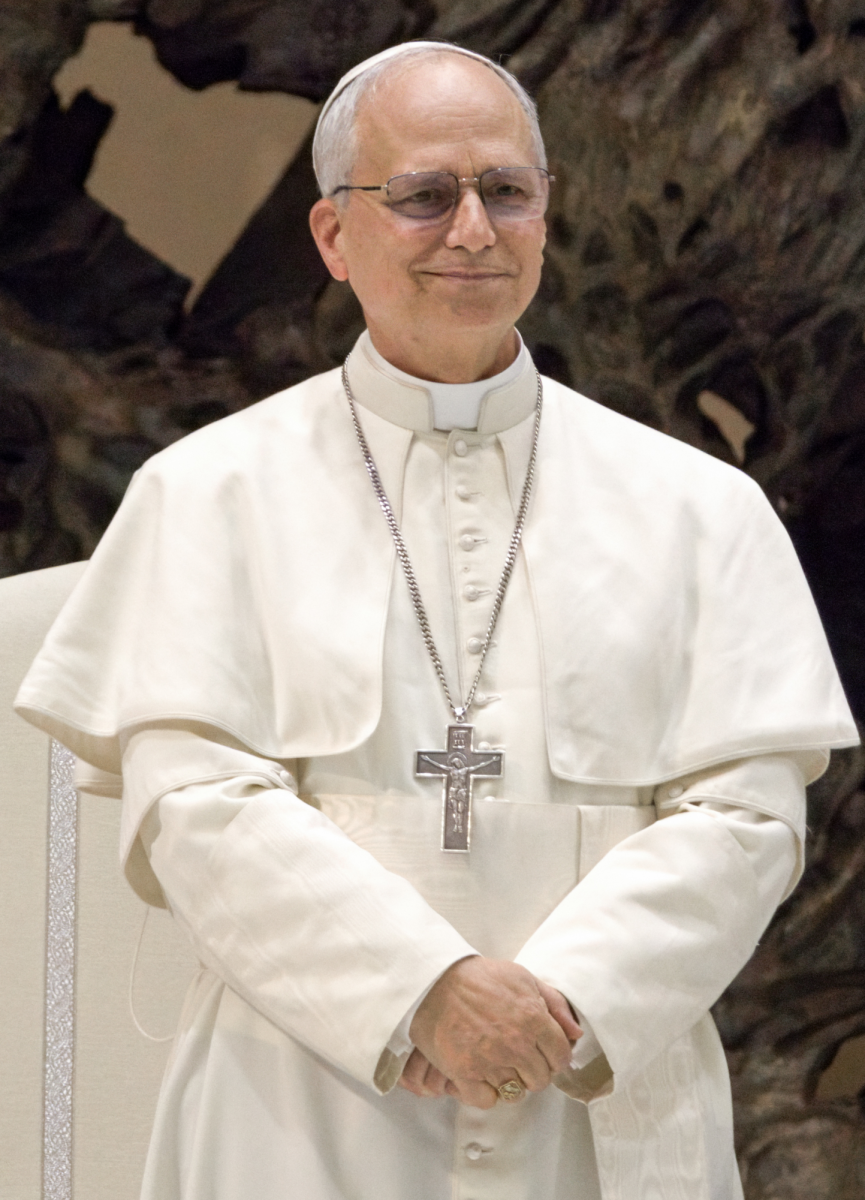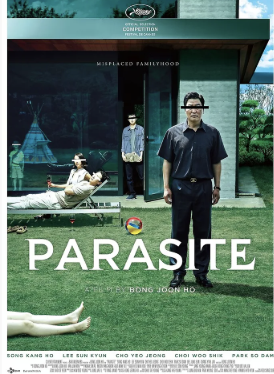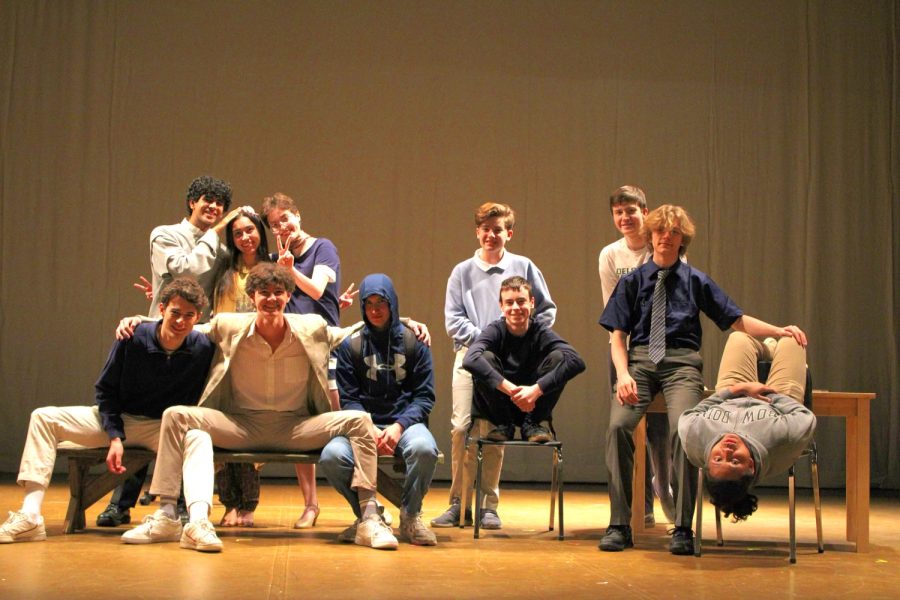One Acts Review
May 18, 2022
On Saturday, April 23, a bevy of actors and actresses came out on Delbarton’s biggest stage to perform three plays (All is Still in Algiers, Childhood Dreams, and Words, Words, Words) for the second, and final time. I have decided to review them here, in the order that they were performed.
All is Still in Algiers, written by Will Ritter, tells the story of Milo the realist and Estelle the delusional, two Europeans trapped in Algiers during a period of ethnic violence, along with Samia, their maid. Ritter is, clearly, a well-read and intelligent writer; one is disappointed, then, when Ritter’s play does not ultimately fulfill the capabilities of its playwright.
All is Still in Algiers certainly has things worth admiring; its ambition, choice of setting, and lack of irony all call back to an era of writerly confidence and loftiness well held-up by the performance of the actors (Eoin Quinn, Bridget Lomax, Mikayla Sharif, and Nedd Kirsch), back to the Golden Age of Hollywood. Ritter’s play engages in history, politics, and the philosophy of being human; that it dares to explore these interests at our school is commendable.
However, All is Still in Algiers is ultimately brought down by the weight of its ambition; it has, as Milo said, flown “too close to the sun”. That Icarus metaphor might serve as a microcosm for the main flaw in the play—bathos. Bathos, coined by Alexander Pope, nowadays means an unsuccessful attempt at greatness (drama and seriousness, typically). One example in All is Still in Algiers is its final scene, where Estelle drunkenly shuffles onto the as Edith Piaf’s “Non, je ne regriette ren” plays in the background. The choice of song in particular is what makes this scene too much; Piaf is so stereotypically and obviously French that her selection may make eyes roll rather than hearts throb.
Another example is that, with few exceptions, the characters’ dialogue is made up nearly entirely of Proustian monologues regarding their own memories of the past; the characters become a mouthpiece for passages that would fit better into a novel. Characters launch into florid, lyric recollections of their past, seemingly unprovoked into such lyricism. Is this what humans do? compare, apropos of nowhere, irises in the garden to muses in Botticelli’s Primavera? ask to die “like Cleopatra”? remark one’s friend “had hair the color of lemons,” or “white as snow”? Where is the political intrigue and emotion suggested by the setting? They are buried under these elaborate and literary monologues. As a result, crunched for time, Ritter slips between expository wordiness and necessary brevity in a confusing manner.
We needn’t demand realism or naturalism in everything we do. Such is a restrictive view of theater. However, a theater of heightened states must still maintain the audience’s suspension of disbelief, and (in a drama like this) their ability to engage with the script unironically. I’m sad to say All is Still in Algiers overextends itself, particularly with its dialogue, and loses sight of those objectives. The skeleton of a great play is, however, undoubtedly present, and it would not take too much change to exhume it; this reviewer advises Ritter to revisit his script, perhaps in a year or two.
Childhood Dreams, written by Hayden Kim, is less ambitious, but better executes the ambition it does have. It centers on the story of a depressed teenage writer named Vince, his imaginary friend Rain, and his relationships with his father and teacher. It must be said that the play’s quality on Saturday was greatly buoyed by the performance of Zachary Cirillo, clearly the night’s standout performer, who gave life and depth even to some of the more sloppily written lines. His every tremor, stutter, and shake felt naturalistic, unforced, and devastating.
However, Kim’s script is, usually on its own, sophisticated and clean enough that it creates something special. It’s a stock piece of advice that writers should refrain from writing writer protagonists; the reasons are numerous—the risk of creeping artistic ego, audience annoyance, overly confessional self-insertion. For the most part, Kim avoids these pitfalls. While the troubles of Vince can sometimes feel more like the playwright’s than the characters, while his voice can sometimes feel overly personal in an authorial sense, Vince ultimately maintains his own identity. Such is helped by the parallel motifs present in the play–the stairs in Vince’s head (which represent his anxiety) and his imaginary friend, Vince and his father, etc.
Most vital to the play’s success, however, is Kim’s accurate portrayal of Gen-Z, teenage anxiety. In the vein of Dear Evan Hansen, it aims to present an intimate portrait of someone invisible. In that respect, it succeeds.
Childhood Dreams also deserves praise for its set and stage design. A doorway centered on the stage cleverly allows characters to transition between scenes, while a spotlight shrinks down the focus and makes more intimate any one scene. Vince monologues both from off the side of the stage and in its center, his feet hanging off the lip. I half expected him to storm off stage and into the aisle, a testament both to Kim’s script and Cirillo’s performance.
Words, Words, Words was the only play of the night not written by a Delbarton student, but a famous writer. It should not be surprising then, it presents more of a polished, professional product. Intellectual and tragicomic, it centers on three intelligent monkeys trapped by an evil doctor, set to uselessly batter on typewriters until, by pure chance, they produce an exact replica of William Shakespeare’s Hamlet. Such a concept, both literary and absurd, melds high-brow literary references and low-brow scatological humor.
However, I am more interested in what can be attributed, at least in part, to Delbarton school—the interpretation of the play by some of our actors. Donovan Perry, Wan Virtudazo, and Nick O’Brien turn out admirable performances as (John) Milton, (Alexander) Swift, and (Franz) Kafka, respectively. Ives’ vision takes form in the exaggerated gesticulations of Swift, the chiding apologism of Milton, and the naive yet successful dreaming of Kafka. The acting of Perry, Virtudazo, and O’Brien is necessarily full-body, physical; the monkeys must crawl around on all fours, crouch, squat, jump and howl. They perfectly capture the satirical elements of the script.
Regardless of what this one critic opines, the efforts of each writer and actor on Saturday, April 23, must be applauded. They put in a level of work and dedication rare to find in high school students, and they directed the whole of their passions towards two nights of performance. Though Delbarton has a reputation for its athletics, it is equally important we foster a thespian attitude and artistic spirit, which entails both criticism (necessary for any true expression of respect) and panegyric.
























